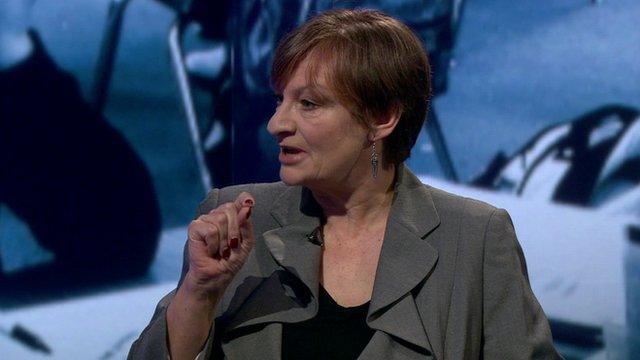Public sector strikes hit schools and services around the UK
- Published
Teachers, firefighters and council staff rallied in what was thought to be the biggest day of industrial action for years
Hundreds of thousands of people have taken part in rallies and marches across the UK as part of a day of strike action by public service unions.
Teachers, firefighters and council workers joined the strike, which follows disputes with the government over pay, pensions and cuts.
Thousands of pupils were affected as some 6,000 schools in England closed, the Department for Education said.
The Cabinet Office described the action as "irresponsible".
But Trades Union Congress (TUC) general secretary Frances O'Grady said workers had gone on strike "to say enough is enough".
The GMB and Unison unions said more than one million people had taken part in the strikes.
But Cabinet Office Minister Francis Maude said fewer than 500,000 had participated.
And a government spokesman said "most" public sector workers had reported for work and "nearly all key public services" were delivered as normal.
Bin collections
Disruption across the UK included:
Some 21% of schools in England were closed, according to the Department for Education. In Wales, 912 schools were closed with 215 others reporting disruption
Museums closed in Edinburgh, Nottingham and Leicester, many libraries were closed, and bin collections were halted in Derby
Some airports - including Heathrow and Luton - warned passengers about possible delays due to border control staff striking
A spokesman said 919 Scottish government staff were taking part in industrial action - just over 12% of the workforce
In Wales, all business at the Welsh assembly was cancelled, the DVLA centre in Swansea warned of delays, while the National Museum in Cardiff closed
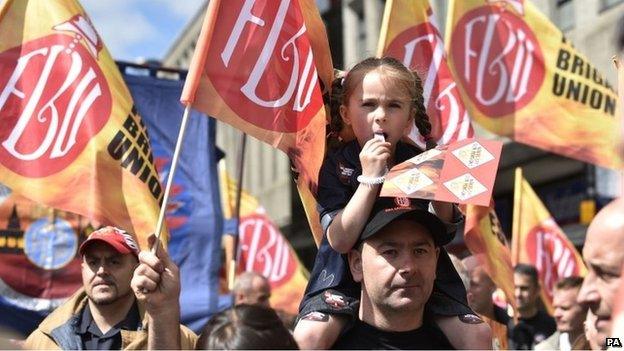
Workers in Newcastle joined those on strike over pay and other issues
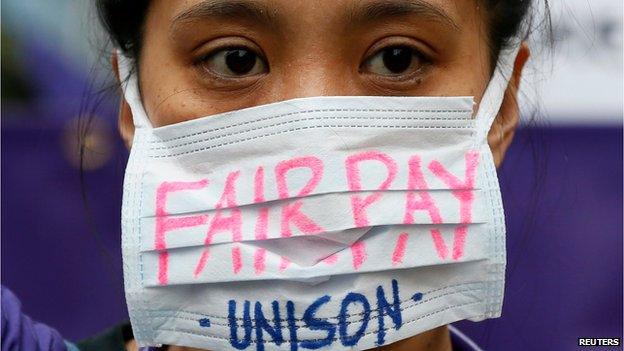
Pay was a central reason for the strikes, unions said
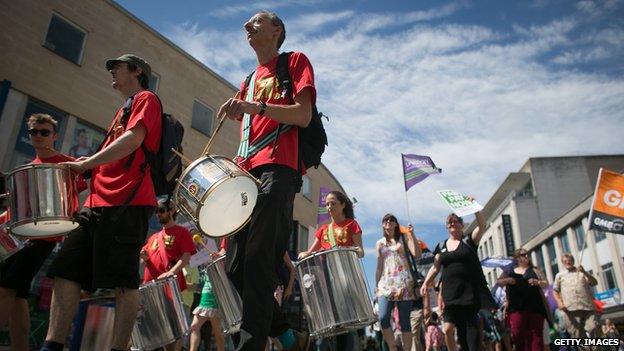
The GMB union said more than one million people were on strike
The government also said one fifth of civil servants - fewer than 90,000 workers - had been on strike and that 717 Jobcentres had been unaffected.
The Local Government Association said around 95% of council staff were at work across England, Wales and Northern Ireland.

At the scene
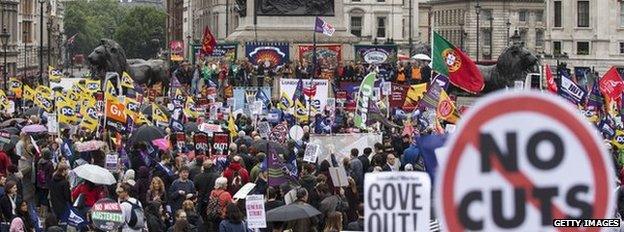
Public sector workers gathered in Trafalgar Square in central London
Sophie Hutchinson at Trafalgar Square
Several thousand demonstrators have marched down London's Regent Street chanting and waving their different coloured banners to a rally in Trafalgar Square.
Workers from right across the public sector are here. They are members of more than six different public sector unions, representing teachers, civil servants, NHS staff, local council employees and firefighters.
All of them are braving the spitting rain and determined to take part in what they insist is their legal right to protest.
The complaint that unites most is over pay. Chants of "fair pay" can be heard from the crowd and the rally began with calls for a living wage, which was met with great applause.
These public sector workers claim that they are not seeing any benefit from a recovering economy and that the pay freeze and 1% cap on a rise which they've seen in the last four years, has left them £4,000 worse off than in 2010.
The mood of this protest is good-tempered and relatively upbeat but the demonstrators' message to ministers shows their growing resentment and frustration.

Thousands of people have taken part in marches and rallies across the UK, with an estimated 1,500 people marching through central London and 2,000 people in Brighton, according to police.
Large rallies were also held in Birmingham, Newcastle, Swansea and several other cities.
Picket lines were also mounted outside courts, council offices, job centres and fire stations across the country as well as outside the Houses of Parliament in London.
Pay cap
The biggest issue in the dispute is pay, after ministers froze public sector salaries in 2010 and introduced a 1% cap on pay rises in 2012 - which remains in place.
Those who have taken part in the action include:
Firefighters, who are on strike between 10:00 and 19:00 BST in a row over pensions and retirement age
The Public and Commercial Services Union (PCS) - which represents civil servants, passport office workers and other public sector staff - in a dispute over pay, cuts to jobs, pensions and the privatisation of services
Unison which represents, among others, workers in local government, healthcare, colleges and schools
The GMB representing, among others, workers who serve school meals, clean streets, empty bins, carers and school support workers, in a row over this year's pay offer
Unite members - including local government staff, council workers and teaching staff - who also dismissed the "insulting" pay offer, external
The National Union of Teachers (NUT), whose general secretary Christine Blower said teachers "deeply regretted" taking strike action
Schools, courts, job centres and council services have been hit in Wales, where around 70,000 public sector workers are on strike
Members of the Northern Ireland Public Service Alliance, who work in a range of areas including housing, youth justice and libraries, striking over pay
RMT members working for Transport for London are striking over pay and pensions, external
For Unite, Unison and the GMB, the strike action covers workers in England, Wales and Northern Ireland but not Scotland, while the PCS covers all four nations. The FBU and NUT have been striking in England and Wales only.
'Failure on all sides'
Addressing the House of Commons, Cabinet Office Minister Francis Maude said responsibility for the disruption caused by the action lay with union leaders.
Ed Miliband: "Nobody wants to see these strikes...they are always a sign of failure"
Labour leader Ed Miliband told the BBC the government should bear the responsibility for the strikes, which represented a "failure on all sides".
Unison general secretary Dave Prentis told BBC Breakfast workers had been left frustrated by over pay.
"When Cameron brought in the two-year pay freeze, our local government workers, our members, had already had a one-year pay freeze.
"So they've had a three-year pay freeze and then a 1% increase when inflation has gone up by something like 20%," he said.
Decent wage
Elsewhere, fire chiefs urged people to take extra care because of the walkout between 10:00 and 19:00 BST - the 15th round of industrial action in the Fire Brigades Union's long-running row with the government.
TUC general secretary Frances O'Grady said: "Across the public sector workers are on strike today to say enough is enough.
"Year after year pay has failed to keep up with the cost of living."

Analysis
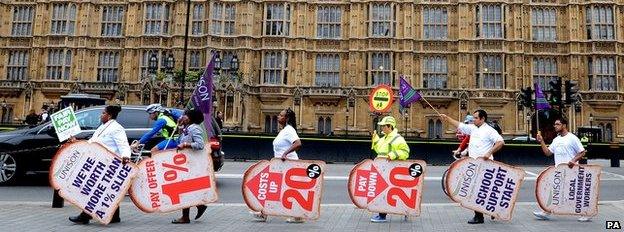
Members from Unison, Britain's biggest trade union, demonstrate outside the Houses of Parliament
BBC political correspondent Norman Smith
Strikes are meant to cause maximum pain for employers but in this case it doesn't look like this is happening.
Why? Because far from causing the government much political grief, today's strikes by public sector workers are actually rather politically convenient.
Of course, there will be much ministerial condemnation of the disruption caused.
But at the same time Conservative ministers hope popular annoyance will buttress support for their plans for further action to curb the power of unions.
In particular, Prime Minister David Cameron is keen to include plans for a strike ballot threshold in his party's next manifesto.
Today's strikes enable ministers to turn up the heat on Labour by pressing them to condemn the industrial action being carried out by their big union supporters.
And they also expect widespread backing in the newspapers for their bullish stance.
So, while in public ministers will appear angered by the strikes, in private they may be a good deal more relaxed.

PCS general secretary Mark Serwotka said the action by public sector workers was about "demonstrating that they've had enough".
He told BBC Radio 5 live: "If that means that fire stations and schools are closed, and there are delays at airports and that people find that they are inconvenienced, whilst we regret the inconvenience, what we're really trying to say is that everyone depends on our members' services, so start paying them a decent wage."
Ballot turnouts
The strikes went ahead despite the government arguing they are based on ballots conducted some years ago, with low turnout from union members.
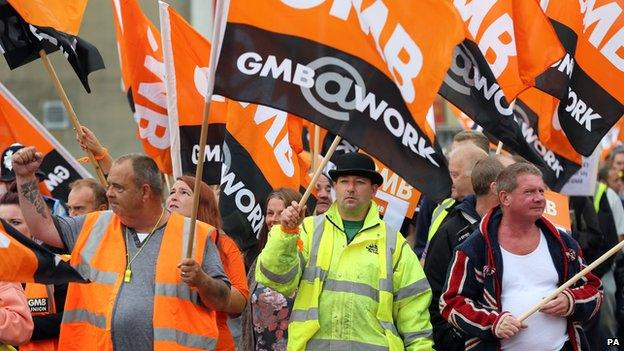
Members of the GMB union made their way through Brighton
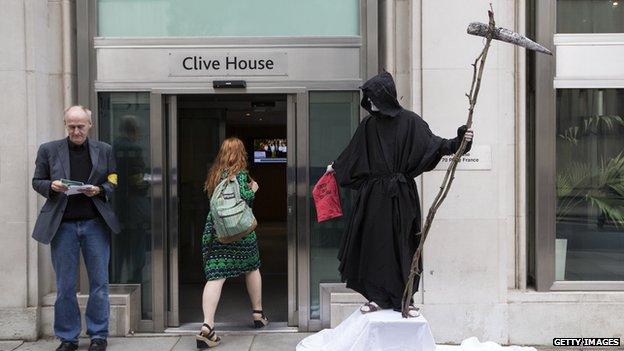
Picket lines were set up across the UK, with a man dressed as the grim reaper protesting in London
On Wednesday, Mr Cameron said the time had come for legislation setting a minimum turnout for a strike ballot, promising this in the next Conservative manifesto.
Under the current law, a strike can take place if it is backed by a simple majority of those union members who vote - regardless of the level of turnout.
Strikers respond to criticisms that their strike does not have a legitimate mandate

At the scene
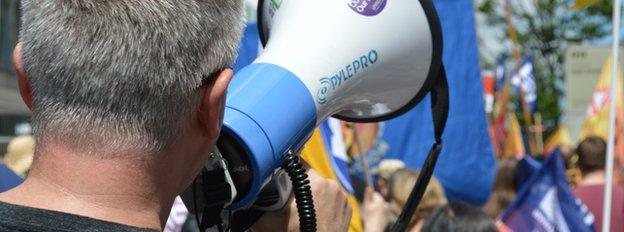
Protests were held in Birmingham's Victoria Square
BBC reporter Jo Black in Birmingham
"We're hard-working people under attack. What do we do? We fight back!"
I'm not sure it will be the next Christmas number one but this was the song blasting out of speakers in Birmingham's Victoria Square and the union members out on strike loved it. They cheered, sang along and waved their flags.
After the singing, the rally moved around the city centre, on the march, past bemused shoppers.
Of course these union members weren't the only ones off work today. Parents with children at schools affected by the strikes were also left with no option but to juggle childcare.
Mums and Dads we spoke to ranged from annoyed to sympathetic, but the government's stance is less balanced.
It says today's action was disruptive and says it will consider looking at introducing tougher anti-strike laws. The government says the case for reforms is gathering pace in the face of ballots with low levels of support.

Education Secretary Michael Gove also criticised the NUT's ballot, which was held in 2012 with a turnout of 27%, telling BBC Newsnight schoolchildren needed protection from "politically-motivated industrial action".
But the union's general secretary, Christine Blower, told the programme it was "perfectly legitimate".
- Published10 July 2014
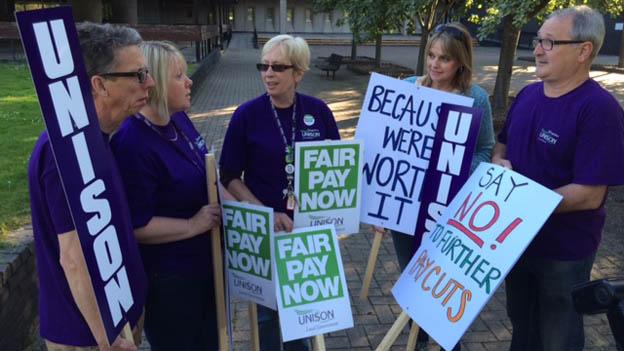
- Published10 July 2014
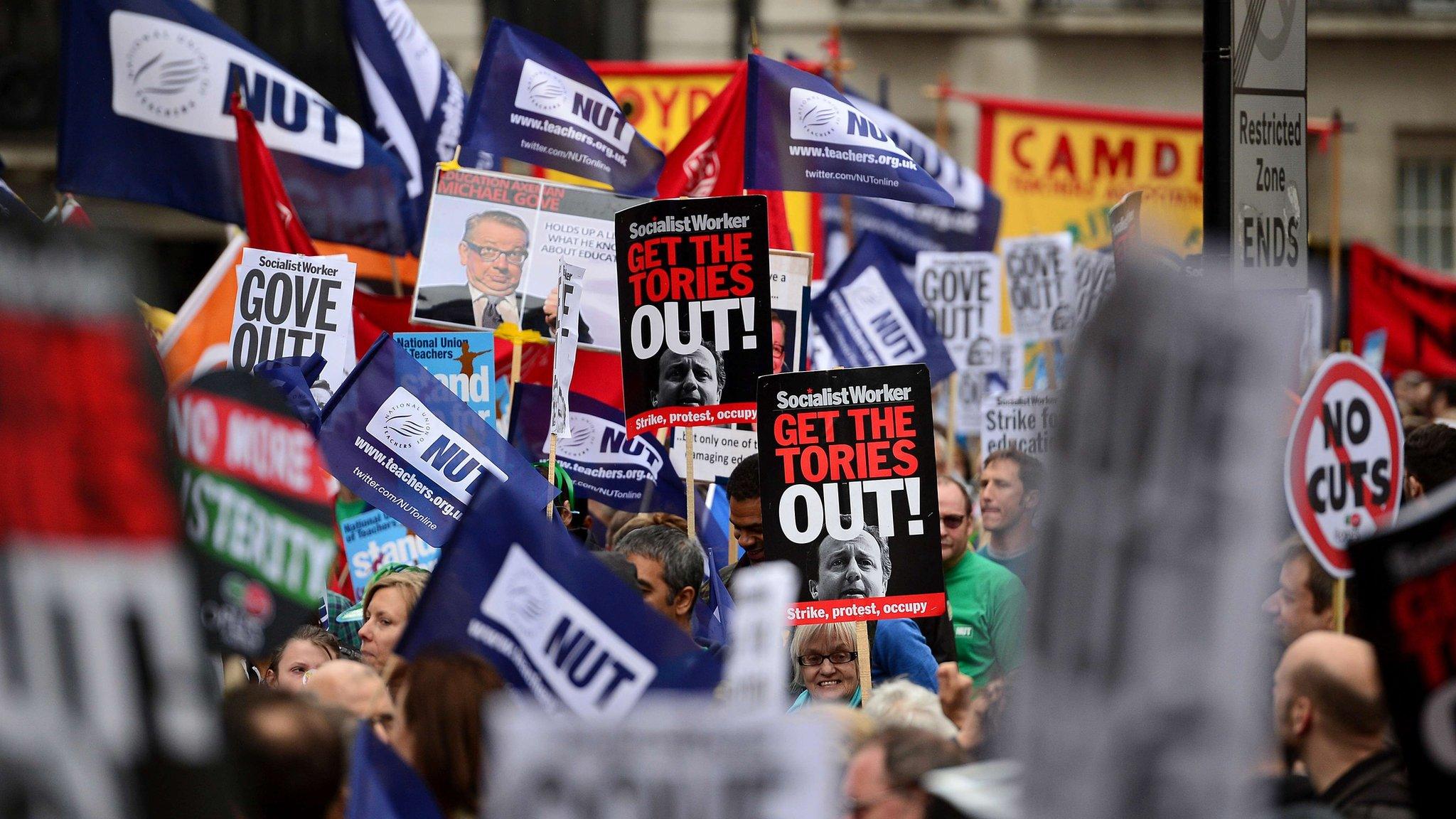
- Published9 July 2014
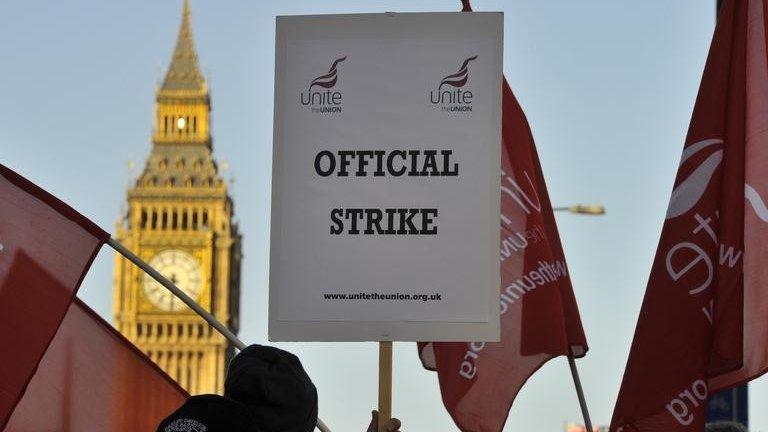
- Published10 July 2014
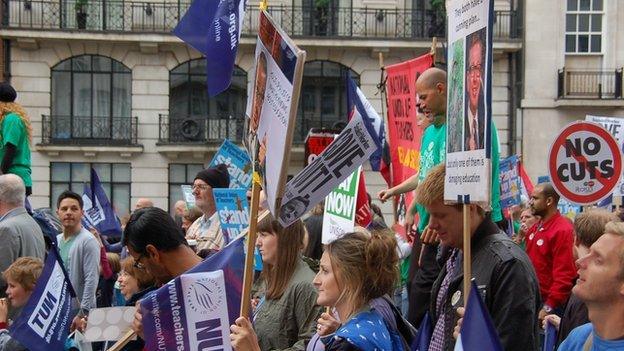
- Published10 July 2014
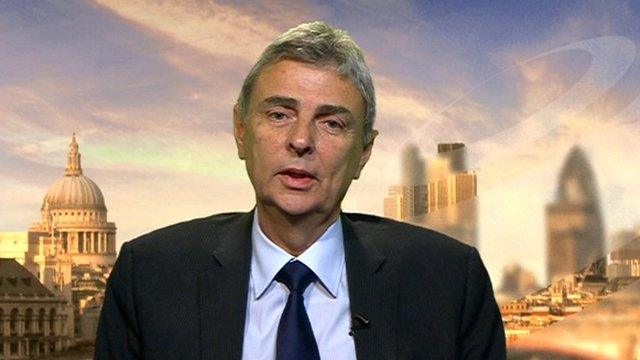
- Published10 July 2014
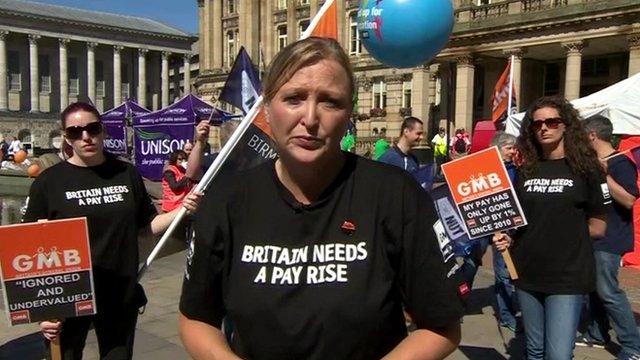
- Published10 July 2014
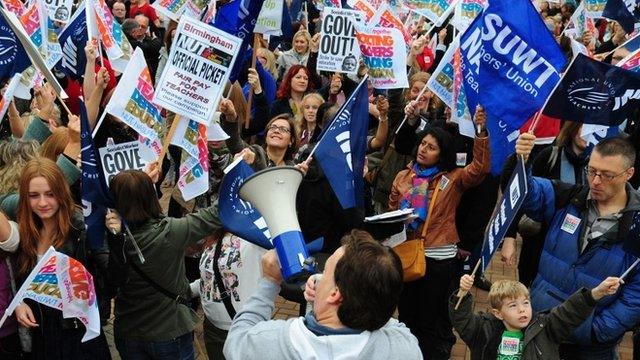
- Published6 July 2014
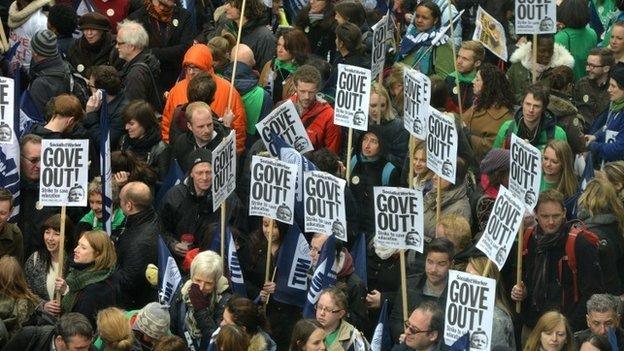
- Published9 July 2014
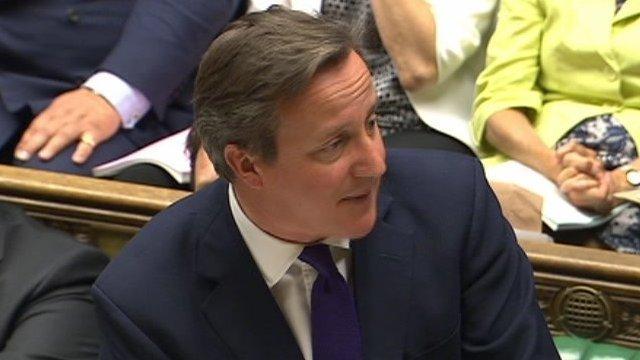
- Published9 July 2014
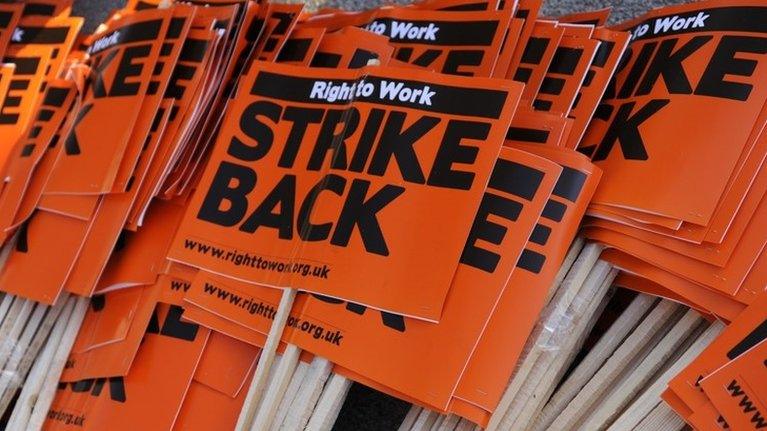
- Published10 July 2014
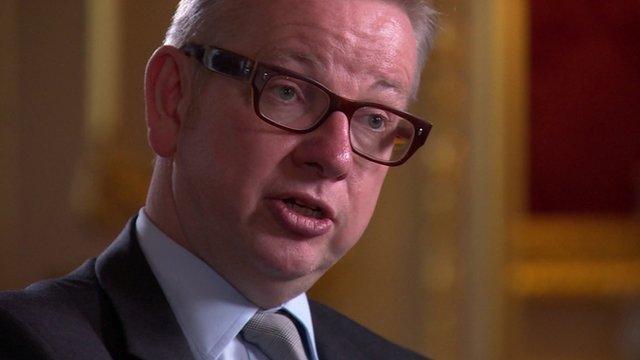
- Published10 July 2014
